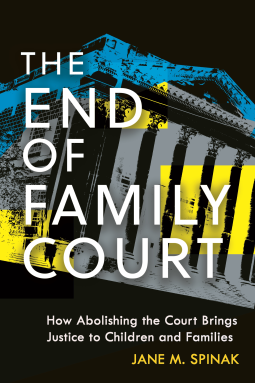
The End of Family Court
How Abolishing the Court Brings Justice to Children and Families
by Jane M. Spinak
This title was previously available on NetGalley and is now archived.
Send NetGalley books directly to your Kindle or Kindle app
1
To read on a Kindle or Kindle app, please add kindle@netgalley.com as an approved email address to receive files in your Amazon account. Click here for step-by-step instructions.
2
Also find your Kindle email address within your Amazon account, and enter it here.
Pub Date Aug 01 2023 | Archive Date Oct 09 2023
Talking about this book? Use #TheEndofFamilyCourt #NetGalley. More hashtag tips!
Description
Explores the failures of family court and calls for immediate and permanent change
At the turn of the twentieth century, American social reformers created the first juvenile court. They imagined a therapeutic court where informality, specially trained public servants, and a kindly, all-knowing judge would assist children and families. But the dream of a benevolent means of judicial problem-solving was never realized. A century later, children and families continue to be failed by this deeply flawed court.
The End of Family Court rejects the foundational premise that family court can do good when intervening in family life and challenges its endless reinvention to survive. Jane M. Spinak illustrates how the procedures and policies of modern family court are deeply entwined in a heritage of racism, a profound disdain for poverty, and assimilationist norms intent on fixing children and families who are different. And the court’s interventionist goals remain steeped in an approach to equity and well-being that demands individual rather than collective responsibility for the security and welfare of families.
Spinak proposes concrete steps toward abolishing the court: shifting most family supports out of the court’s sphere, vastly reducing the types and number of matters that need court intervention, and ensuring that any case that requires legal adjudication has the due process protections of a court of law. She calls for strategies that center trusting and respecting the abilities of communities to create and sustain meaningful solutions for families. An abolitionist approach, in turn, celebrates a radical imagination that embraces and supports all families in a fair and equal economic and political democracy.
Available Editions
| EDITION | Other Format |
| ISBN | 9781479814084 |
| PRICE | $37.00 (USD) |
| PAGES | 352 |





